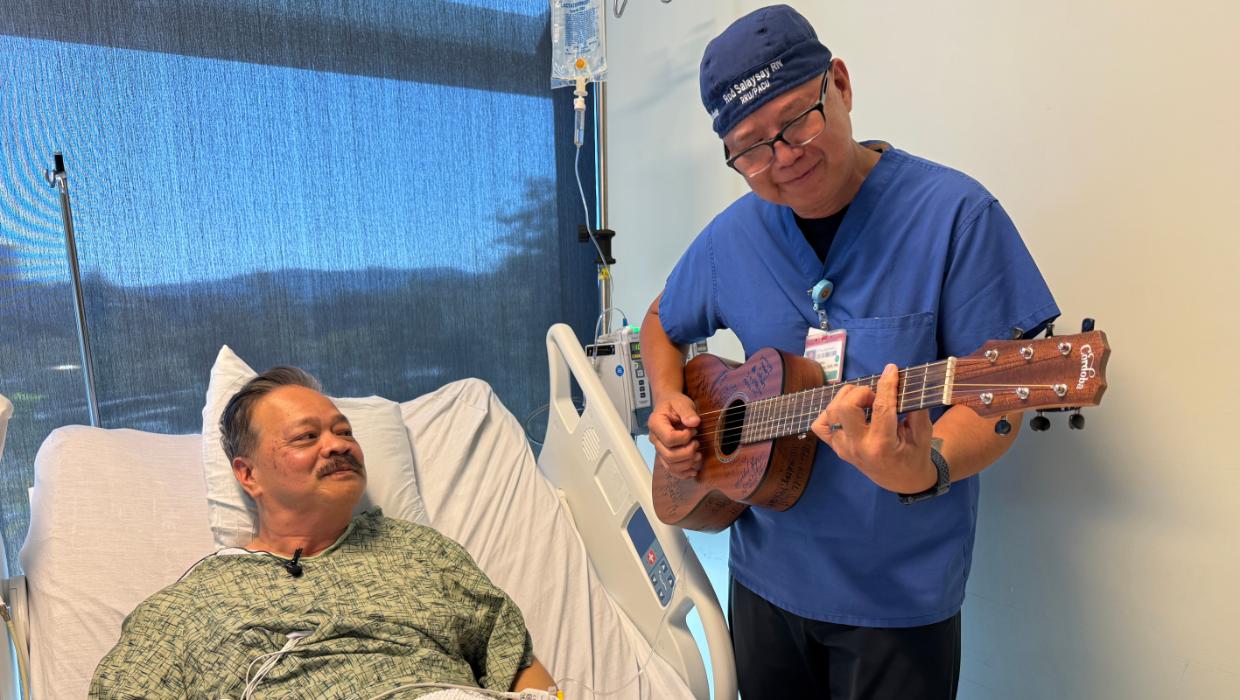Health
Scientists Explore Music’s Role in Alleviating Surgical Pain

Research has revealed that music can significantly alleviate pain associated with surgery and illness. According to a study conducted by researchers at the University of Utah, incorporating music into patient care may serve as an effective non-pharmacological tool for pain management. This innovative approach emphasizes the potential benefits of music as a distraction, drawing focus away from discomfort.
The study, published in 2023, highlights how music can create a calming environment, positively influencing patients’ perceptions of pain. Dr. David Bradshaw, one of the lead researchers, stated that music engages the brain in a way that helps diminish the experience of pain. “When patients listen to music, they often report feeling less anxious and more relaxed, which can contribute to lower pain perception,” he explained.
Understanding Music’s Impact on Pain Perception
The findings suggest that music not only serves as a pleasant auditory experience but also plays a critical role in pain management strategies. In controlled clinical settings, patients who listened to music before and after surgical procedures reported a marked decrease in pain levels compared to those who did not have access to music. This has significant implications for the healthcare industry, particularly in enhancing patient comfort during recovery.
The research indicates that music can be particularly beneficial in surgical contexts, where anxiety and discomfort are prevalent. By integrating music therapy into standard care protocols, healthcare providers may offer a complementary approach that reduces reliance on opioid pain medications, known for their addictive properties and side effects.
Dr. Bradshaw noted that the study urges healthcare professionals to consider music as a viable option in treatment plans. “We are only beginning to scratch the surface of understanding how music can transform patient experiences,” he remarked.
Future Implications for Healthcare
The implications of this research extend beyond just managing pain. Hospitals and clinics may soon explore ways to incorporate music more systematically into patient care. This could involve creating playlists tailored to individual patient preferences or utilizing live music performances in waiting areas and recovery rooms.
As healthcare systems strive to enhance patient-centered care, the integration of music therapy could become a standard practice. In light of rising concerns about opioid dependency, alternative methods of pain relief are more crucial than ever. The potential for music to enhance recovery experiences presents a promising avenue for improving overall healthcare outcomes.
In conclusion, the integration of music into pain management strategies offers a multi-faceted approach that could reshape traditional methods of treating surgical and chronic pain. With ongoing research and increasing interest from the medical community, music may soon take its place as an essential tool in the healthcare toolkit. As Dr. Bradshaw aptly puts it, “Music has the power to heal in ways we are only beginning to understand.”
-

 World4 months ago
World4 months agoTest Your Knowledge: Take the Herald’s Afternoon Quiz Today
-

 Sports4 months ago
Sports4 months agoPM Faces Backlash from Fans During Netball Trophy Ceremony
-

 Lifestyle4 months ago
Lifestyle4 months agoDunedin Designers Win Top Award at Hokonui Fashion Event
-

 Entertainment4 months ago
Entertainment4 months agoExperience the Excitement of ‘Chief of War’ in Oʻahu
-

 Sports4 months ago
Sports4 months agoLiam Lawson Launches New Era for Racing Bulls with Strong Start
-

 World5 months ago
World5 months agoCoalition Forms to Preserve Māori Wards in Hawke’s Bay
-

 Health4 months ago
Health4 months agoWalking Faster Offers Major Health Benefits for Older Adults
-

 Lifestyle4 months ago
Lifestyle4 months agoDisney Fan Reveals Dress Code Tips for Park Visitors
-

 Politics4 months ago
Politics4 months agoScots Rally with Humor and Music to Protest Trump’s Visit
-

 Top Stories5 months ago
Top Stories5 months agoUK and India Finalize Trade Deal to Boost Economic Ties
-

 Health2 months ago
Health2 months agoRadio Host Jay-Jay Feeney’s Partner Secures Visa to Stay in NZ
-

 World5 months ago
World5 months agoHuntly Begins Water Pipe Flushing to Resolve Brown Water Issue









